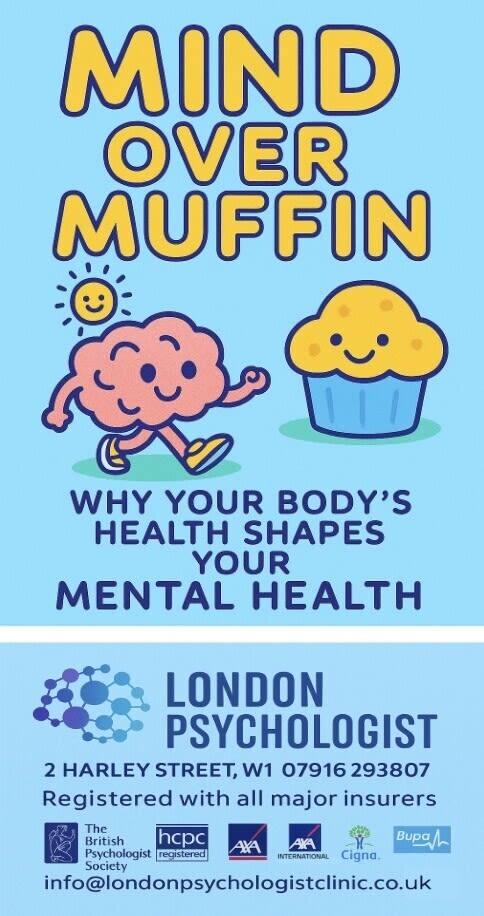Mind Over Muffin

posted 24th July 2025

Mind Over Muffin: Why Your Body’s Health Shapes Your Mental Wellbeing
In the world of psychology, it’s often said that the body keeps the score. But less often do we acknowledge that the body also sets the stage.
As Buddha once wisely noted, “To keep the body in good health is a duty, otherwise we shall not be able to keep our mind strong and clear.” And yet, in today’s hyper-caffeinated, sleep-deprived, “wine o’clock” culture, physical wellbeing often takes a backseat to convenience, speed, and the siren song of Deliveroo.
Let’s face it—modern life is not designed with mental clarity in mind. We live in a world where ultra-processed foods are more accessible than fresh air, sleep is a luxury, and "rest days" are reserved for when you’ve caught the flu. Clubbing until 3am and then expecting to wake up refreshed and balanced? Even your nervous system’s laughing.
But here's the real kicker: your physical habits profoundly impact your brain. Junk food doesn’t just affect your waistline—it can affect your mood. Excessive sugar has been linked to increased symptoms of anxiety and depression. Regular alcohol consumption (even if it's just that daily glass of red you swore was for your heart) can disrupt neurotransmitters like serotonin. And sleep? That’s the real holy grail of brain health. Chronic sleep deprivation has been shown to impair memory, emotional regulation, and even shrink the prefrontal cortex over time.
So why do we keep doing it?
Partly because habits are hard to break—and partly because many people don’t realise how interconnected their bodies and minds truly are. If you're constantly feeling low, anxious, irritable or foggy, it might not be just your circumstances—it might be your circadian rhythm crying out for mercy.
The Psychology of the Physical
Your nervous system thrives on routine: regular meals, hydration, movement, and downtime. When we ignore these fundamentals, the brain compensates—often in less-than-helpful ways. Poor physical habits can exacerbate symptoms of depression, anxiety, burnout, and more. Conversely, small physical shifts—like walking daily, eating whole foods, or getting to bed at a consistent time—can begin to lift the mental fog.
In therapy, we often say: the mind and body are not separate entities. Your body is your mind’s home. If that home is flooded with cortisol from stress, running on caffeine and cravings, and constantly deprived of rest, it’s not surprising that psychological symptoms worsen.
“You Can’t Meditate Your Way Out of Malnutrition”
Sure, mindfulness and cognitive strategies are powerful—but if your blood sugar is crashing or you’re running on three hours of sleep and instant noodles, your brain is running on fumes. As psychologists, we help clients not only explore their emotional world but understand the physiological underpinnings that might be quietly contributing to their mental health struggles.
Therapy doesn’t mean we hand you a kale smoothie and a yoga mat—but we might explore what it means to truly care for your body as an act of emotional self-respect. This includes recognising the seductive comfort of behaviours that don’t serve us—whether it’s recreational drug use, emotional eating, compulsive scrolling, or escapism masked as productivity.
When to Seek Help
If your habits are beginning to interfere with your wellbeing—perhaps you’re noticing persistent low mood, heightened anxiety, irritability, fatigue, or a sense of detachment from life—it may be time to speak to a psychologist. A clinical psychologist can help you assess the root causes of emotional distress and work with you to build a toolkit that supports both your physical and psychological wellbeing.
We understand that change is difficult—especially when habits have formed over years. But we also know that even the smallest step (like prioritising a full night’s sleep or drinking more water) can create ripples that improve how you think, feel, and function in the world.
Because ultimately, your mind can’t thrive in a body that’s been neglected. And no, unfortunately, green juice doesn’t cancel out a weekend binge or an anxious nervous system running on empty.
But with the right support, balance is possible—and so is peace of mind.



